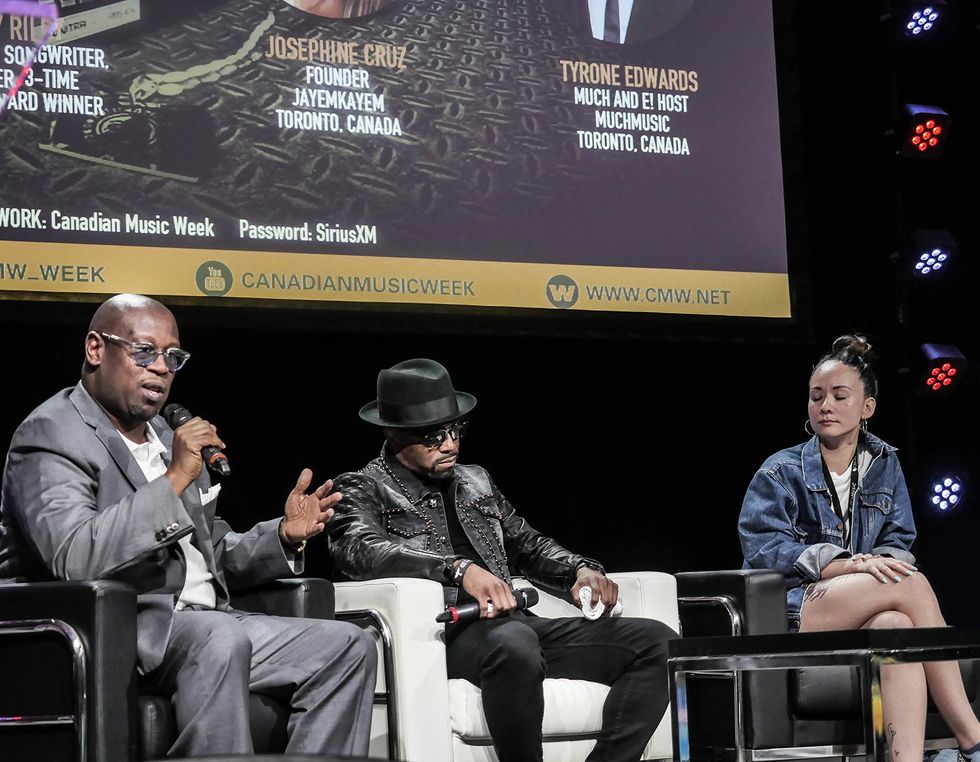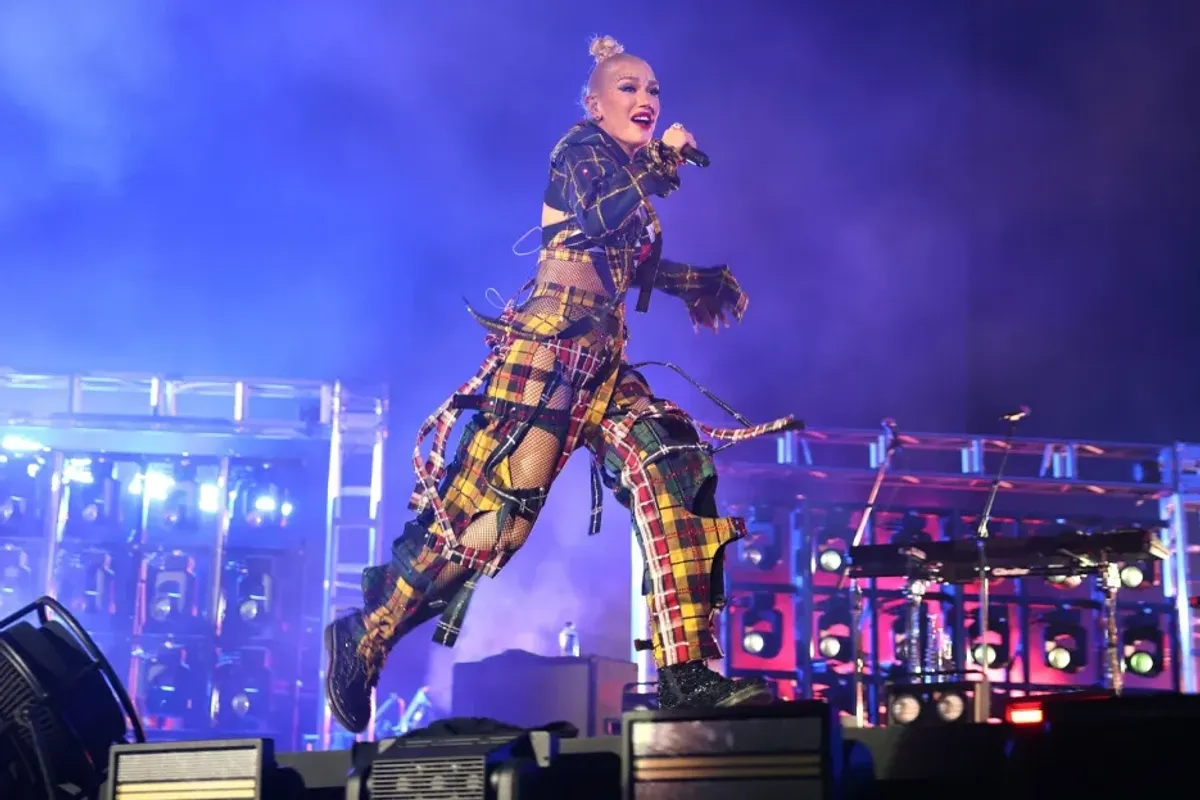CMW 2018 Thursday Wrap
CMW's Thursday Wrap falls under two categories: the Radio Interactive Panels and the Live Touring Panels.

By FYI Staff
CMW's Thursday Wrap falls under two categories: the Radio Interactive Panels and the Live Touring Panels.
Topics include Inclusivity, concert industry trends, a pow-wow of top radio executives and identifying the true stories behind concert ticket woes.
8:45 a.m. - Global Forum: Inclusivity and Accountability - Bringing Measurable Change for the Music Industry
"I am going to depress you, so be forewarned." Ominous words from Dr. Stacey Smith of the Annenberg Inclusion Initiative gave us fair warning that the stats that she was about to impart on us involving the role of women and minorities in the music industry -- particularly the creative side - would not be warm and fuzzy. But she did open up and state that it was "so refreshing to be with an organization that starts off the day with a form in front of everyone about an inclusion pledge, because I think all of us that are interested in issues of diversity and inclusion are really interested in ensuring that everyone feels like they belong. And if people feel like they belong and there's equity in the workplace, safety becomes something that's eviscerated and minimizes exponentially in those contexts." Smith, who pioneered the concept of the "Inclusion Rider" mentioned by Academy Award winner Frances McDormand on the podium earlier this year when she accepted her award, then claimed that the Annenberg Inclusion Initiative did three things "really well:" Research, advocacy and action, "meticulously" studying the film and television worlds over the past 12-14 years. Turning her attention to music, Smith said her organization studied 600 pop songs on Billboard released from 2012 to 2017. Observing 1200 individual performers, 2800 songwriters and 651 producers, paying particular attention to the presence of women and people of colour on the charts. Smith said women were "clocking in" at 22% in terms of chart presence, with a gender ratio of 3.5 males to every female. Part of her research claims that "females are often written off as songwriters," down to contributing 12% over the last few years, and offered similar stats of inclusion - ranging from an average of 20% to 30% in most categories, with the exception of producers, where there were no women involved as producers in making those hits. Smith admitted that the studies do not take into account music's subjectivity and the cycles of music, "but we will be doing that." She certainly left the breakfast crowd with more food for thought. (Nick Krewen)
9:35 a.m. - The Future Is Female: Leading Women Tackle #MeToo, #Times Up and Equality In The Workplace
Moderated by this year's Rosalie Award recipient Maureen Holloway, this panel that included Rogers Radio SVP Julie Adam, CARAS COO Jackie Dean, Interactive Ontario president Christa Dickinson, CBC Radio Executive Director Susan Marjetti and Corus Entertainment EVP/COO Barbara Williams cut to the chase when discussing issues of harassment and equality in the workplace, in a packed room that was evenly split between concerned men and women. Holloway's first question was whether the women on the panel believed that sexism and misogyny were even more rampant in the broadcasting industry. Julie Adam replied that she wanted to start on a positive note, that she had worked for some amazing men, that the workplace should create an environment where everyone felt safe, should be able to speak their mind, and people should be considered for jobs regardless of their cultural background or gender. But she acknowledged that the business had its fair share "of great people and not so great people." However, Corus' Barbara Williams, while acknowledging she worked with a lot of great people, was "shocked" and "appalled" at the lack of women in leadership in radio at Corus...and "really surprised at the "continuing old style of on-air talent at local stations where men are getting away with a whole pile of stuff on the air and off the air that I don't think is appropriate." Susan Marjetti admitted that the entire culture of the CBC had changed "post-Ghomeshi" and Jackie Dean talked about holding a closed-door conference for women and receiving a number of self-empowering suggestions.Of course, a panel summary isn't the place to get in too deep to the topic, suffice to say that women on the panel will be vigilant in all areas where they have the opportunity to demonstrate leadership by example. (Nick Krewen)
9:45 a.m -. The Evolution Of Live: Trends In The Event Biz
Skilfully moderated by Goldenvoice's Elliott Lefko, speakers at the well-attended panel discussed the evolution of the live festival and concertgoing experience from their individual perspectives, with all agreeing that great progress is being made in improving that situation for the music fan. Ticketmaster Canada's Monique Barbieri plugged their Verified Fan initiative, designed to get tickets into the hands of real fans, not scalpers. She claims that Verified Fan has drastically reduced the percentage of tix reaching the secondary market from 40% to 5% and that it also gives promoters and artists valuable fan data. Kevin Goodman of Front Row Center detailed intriguing sponsorship stunts, like the "Music for your rears" toilet paper/washroom upgrades at Montreal's Osheaga two years ago. Veteran agent Jack Ross noted that, "it is fascinating to watch our biz evolve in the digital age. Direct communication between artist and fans is now key." Lefko mentioned the ease of how that communication is conducted "now that everyone has a phone. It's a far cry from when I would be on out on Queen Street West pasting up posters for my Toronto shows." (Kerry Doole)
1:00 p.m. - The Power Of Being Independent In 2018.
The full house for this panel was comprised mostly by artists; proof that the concept of remaining independent is the preference of many. The upbeat takeaway from this conversation is that there has never been a better time to be indie. Advances in technology are helping the indie labels and artists compete on a more even playing field and this sector now holds its largest market share in decades. Moderator Patrick Ferrell of US trade org A2IM noted that it began in 2005, that market share has increased 12% to 38.4% globally. Reps from ATO, XL and Redeye sounded optimistic about their situation, and Molly Neuman of Songtrust explained that her organization is making it possible for independent artists and publishers to accurately track their earnings globally. XL's Patrick North sagely advised artists to focus on the creative, not just chase playlists, and to not overly rely on outside parties with open pocketbooks. All agreed that vinyl and independent music retailers are crucial for their business (Kerry Doole)
1:00 p.m - The Evolution of Hip-Hop
Hip-Hop has been around a good 45 years, displacing rock n’ roll some 20 years ago as America’s music. Along with a groove and attitude to counter once-prominent genres, hip-hop doesn’t need to curry favour with traditional avenues of exporting music. As the rise of hip-hop and the technological revolution runs parallel to each other, they continue to aide and abet one another. Any aspiring producer can record from his bedroom, mix, master and drop it on the public on a whim: an artist and a few inspired/enterprising friends can easily mount a campaign, collect emails, market and sell.
“I feel when artists put their music on the internet and not monetize it, they are just giving it away, and the track could be a hit,” says Teddy Riley, Father of the New Jack Swing movement of the late '80s/early '90s. “For me to have over 1000 records in my catalog, I never gave anything away. If I did, it would be for a favour.”
Andre Harrell, Revolt Media & TV's vice-president, said the hip-hop industry is on the rebound.
“When album sales went down, the business lost a lot of money. From 2001 – 2010, those were lean years. It’s just starting to be profitable again, based on streaming. We are getting the monetary part right. Now, we have to figure out how to get the creative part right and make great albums,” he notes. (Bill King)
1:40 p.m. -The Top-of-the Top Executive Session
Talk about a stark contrast between worlds: Hip-hop is all swagger and confidence and certain of their audience appeal. Radio, not so much! As Caroline Beasley, CEO of Naples, Florida-based Beasley Media Group and owner of 63 radio stations mentioned, terrestrial radio has been losing audience share the past 20 years. Advertising dollars that flowed so easily into the coffers of most listened-to stations is now divided up over numerous platforms with Facebook and Google being primary competitors. “Money is the best way to measure the health of the industry,” observed moderator Sharon Taylor. “Is radio making real dollars like it did 20 years ago”?
Corus Entertainment's Troy Reeb begged to differ.
“On an individual basis, revenues are going down," he declares. "If you look at terrestrial radio, it’s dropping by a couple points every year. On average it will tick up and then go down, but it’s in decline. That’s not surprising: We are in a world of fragmentation and everyone has a myriad of options in how they consume content."
A decade ago I could ask how many in this room watched this show at 9 o’clock and half the room would have put up their hand. If I asked how many listened this morning I’d be hard pressed to find a large number coalescing around a single source of entertainment.” (Bill King)
2:00 p.m - How Ticketing Technology is Reinventing the Fan Experience
Ticketmaster president Jared Smith was put under the journalistic crosshairs of Alan Cross to explain some of the mysteries behind ticketing, and to Smith's credit, he didn't shirk away from the request. So here's a brief synopsis of what we discovered: the reason Ticketmaster first charged a convenience fee was to get the public to pay for the software it was offering retailers for free to get an edge on business by providing distribution. And then the venues wanted a share of the revenue source, hence the venue fee. And now that Ticketmaster bears the burden of the cost of the software, the hardware, the printers and computers, plus paying for the exclusive rights to sell at the venue, they receive only a percentage of that convenience fee, which Smith estimates is "15% to 20% of the face value of the ticket," which he says could be "$2,$3,$4 dollars." So there's a bit of an insight into the world of Ticketmaster, and we'll be expanding this summary into a bigger article soon. (Nick Krewen)
3:00 p.m. Who's Got Tickets - And How Did They Get Them? The Industry Answers Back
In a panel that included the participation of The Feldman Agency's Joel Baskin, ShowClix' Bruce Morrison, Stubhub's Jeff Poirier, Ticketmaster's Patti-Anne Tarlton, MLSE Canada's Wayne Zronik and moderated by the Globe and Mail's Josh O'Kane, the answer of the instant sellout was proffered and analyzed. Yes, bots certainly helped play the role, but the idea that the supply disappeared as soon as on-sale was conducted was sort of pooh-poohed by the pros. Stubhub's Poirier stated that concerts never really "sell" out: that there is always a ticket available for someone who is willing to pay the price to see it. The panel also talked about how Taylor Swift was doing record business with her current Reputation tour despite tickets still being available for several venues, and how the new Ontario Ticket Sales Act, coming into play on July 1, probably won't be able to enforce resale caps. (Nick Krewen)

















